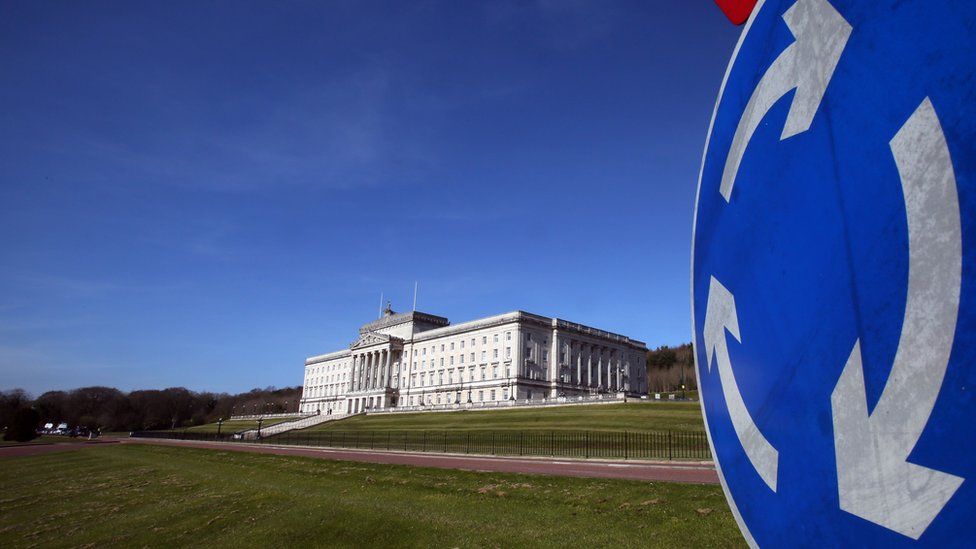Stormont power-sharing talks deadline set for 29 June
-
Published
-
comments

A new deadline of 29 June has been set for Northern Ireland politicians to restore a power-sharing executive.
The details are contained in emergency legislation presented to Westminster.
The new deadline allows for more talks after the general election on 8 June.
The bill shows the secretary of state acknowledging in law the difficulty the election campaign poses for the NI talks process, says BBC political correspondent Stephen Walker.
It will be debated at Westminster on Monday and is expected to become law before parliament is dissolved in May.
"This bill gives the parties the legal authority to convene the assembly, appoint ministers and get on with the resumption of devolved government at any point up to 29 June," Mr Brokenshire said.
"This is what the people of Northern Ireland voted for on 2 March, and should remain the focus in the weeks ahead."
There had been speculation an assembly poll could be held on the same day as the general election, but that idea has now been ruled out by London.
The legislation also sets a regional rate for Northern Ireland in 2017-18, which will see an increase of 1.6% in line with the measure of inflation used.
The Department of Finance said rate bills would be issued mid May, enabling ratepayers to make their usual 10 instalments.
Analysis: BBC News NI political correspondent Stephen Walker
By creating this new deadline, James Brokenshire clearly wants to focus minds when the election campaign is over.
The new timeframe - the third in recent months - may also deter his critics from calling for an immediate assembly poll.
Mr Brokenshire essentially hopes for three things:
- He can keep the political talks process alive and, in the short term, avoid a fresh election or direct rule
- The parties maintain some kind of contact in the weeks ahead, allowing the work of previous talks to be built on
- The election campaign will not be so bruising that any recent goodwill developed evaporates
Anti-Brexit pact
Meanwhile, Green Party leader Steven Agnew and SDLP leader Colum Eastwood have discussed the possibility of an election pact that would maximise opposition to Brexit.
"We didn't get into any great detail, just whether not in principal the Green Party would consider it," said Mr Agnew.
"The reality is we're in a situation where it's first past the post, the prime minister is trying to make this another referendum on Brexit.
"This is the biggest political decision for the people of Northern Ireland since the Good Friday Agreement and I think we have to give it serious consideration now."
His party had not taken a decision on the pact, said Mr Agnew, and would not make a knee-jerk reaction.
"Given the magnitude of the situation we have to give it consideration," he added.
Mr Eastwood said: "We are interested in a conversation with any party interested in protecting the interests of people in Northern Ireland in the face of a hard Brexit," he told the BBC's Evening Extra programme.
"I went out of my way to speak to Steven Agnew (Green Party NI leader). I asked him to consider how we best take this forward."
Pressure on Brokenshire
The secretary of state has been under pressure from nationalist parties angry at the prime minister's decision to call a general election in the middle of the Stormont stalemate: Sinn Féin and the SDLP have been scathing about the snap election.
They say it exposes the government's lack of interest in the ongoing negotiations at Stormont, where round-table discussions aimed at restoring power-sharing are due to resume next week.
Sinn Féin's northern leader Michelle O'Neill said the British government would prefer for there to be no assembly than one that opposed Brexit.
"The people of the north who voted to remain in the EU are regarded as saboteurs by Theresa May and her clique of Tory Brexiteers," she said.
"We are no more than collateral damage."
Alliance leader Naomi Long said that people were never in a compromising mood in the run-up to an election.
But she said it would be better for Northern Ireland if an agreement could be reached soon.
On Wednesday, MPs voted overwhelmingly to back the prime minister's call for a snap general election on 8 June - three years ahead of schedule.
Shadow secretary of state Dave Anderson - who is not running for re-election on 8 June - accused the prime minister of treating the people of Northern Ireland with contempt by calling the snap poll.
He said: "They're being ignored by this government in exactly the same way as they were ignored pre-Brexit when people were saying to them: 'Are you really aware what you're doing?'"
-
-
Published19 April 2017
-
-
-
Published2 June 2017
-
-
-
Published19 April 2017
-
-
-
Published18 April 2017
-
-
-
Published18 April 2017
-
-
-
Published28 March 2017
-